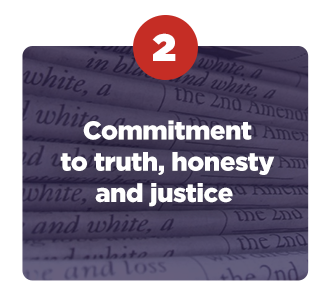THE ARAW 7 CORNERSTONE VALUES
THE ARAW 7 CORNERSTONE VALUES
The Araw Values Awards is organized by the Ad Foundation of the Philippines to uphold traditional and positive Filipino values in the industry and promote responsible advertising.
Communications under this category acknowledge spiritual need as a basic human need, and therefore uphold people’s belief of faith in a God, a Higher Being, or a Spiritual/Supernatural Realm. Such communications further recognize and enjoin respect for the many forms of faith/religious/spiritual expression from local devotions, traditional rituals and worship, to organized religion and institutional practices. Communications can also highlight the invaluable contribution of religious and spiritual practice to social cohesion and harmonious and compassionate living.
Communications under this category value the use and transmission of accurate, factual and verifiable information, and reasoned analysis, particularly by those in media (traditional/mainstream and social media), engaged as they are in news reporting, forming and shaping opinions, and educating the public on world affairs and current developments. Guided by this, communications help ensure adherence to fairness and ethical conduct and principles.
Communications under this category promote pride of place in/for the Philippines and foster a sense of national (Filipino) identity. Communications that likewise promote knowledge and appreciation of Philippine history and geography; the overlays of cultural, religious, political and economic influences that have shaped the country over time (Hispanized, Christianized, Sinicized, Americanized, and currently maybe being Asianized); and celebrate the country’s living traditions and unique heritages, and artistic and creative expressions, products and industries.
Communications under this category acknowledge families as the building blocks of societies, and emphasize the importance of a) family bonds and relationships, which in the Philippines include a slew of extended kin and relatives from different generations and arising from various affinal (marriage) and consanguineal (blood ties); b) responsible parenting on the part of adults; and c) filial respect and affection on the part of children and the youth.
Communications under this category raise consciousness of the dignity of the individual amidst existing social distinctions arising from the multi- ethnic/linguistic character of Philippine society and its demographic differentiation into age, sex and gender-orientation groups, socio-economic classes, physical and mental-ability categories, etc. Communications that likewise support non-discriminatory policies and programs and efforts designed to safeguard basic individual rights to life, liberty and happiness, and accord to one and all related political, economic, socio-cultural rights and freedoms.
Communications under this category help develop notions of civics and the common good and draw attention to how individuals contribute to the functioning of societies. Communications that further extol the values of social responsibility and good citizenship – i.e., respect for authority and the rule of law, paying taxes, abiding by the traffic rules, not littering and keeping one’s surroundings orderly and clean, volunteering in local community charities and development projects, etc.
Communications under this category advance knowledge and understanding of the interconnectedness of all living things and the physical world or Planet Earth, and the imperatives of maintaining the fragile balance of this ecosystem. Communications in this category may thus touch on such themes and topics as the necessity of conserving nature and the biodiversity obtaining in plant, animal, and marine life, and the environmental threats posed by increasing industrialization and economic growth, and by consumerist behavior and lifestyles. Communications here can also inform on and enjoin support for policies and programs meant to arrest further environmental degradation as reforestation, the cleaning of oceans and water bodies, waste reduction and the recycling of products, the shift to cleaner fuels and green energy, regulating extractive industries and technologies, and curbing wasteful consumption among households, communities, offices and the public.








